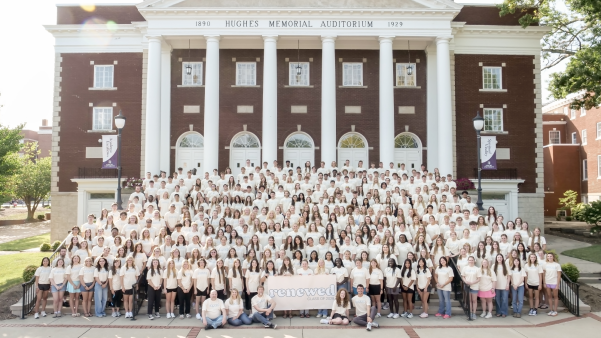Rihanna recently confirmed what most of her fans were expecting: Yes, she and ex-boyfriend Chris Brown are back together. Last night, they sat together at the Grammy's.
While celebrity couples frequently make headlines, Rihanna and Brown have garnered special attention due to their rocky past. On the night of the 2009 Grammy's, Brown was arrested for assaulting Rihanna in a domestic dispute, and soon after the altercation, photos emerged of the beautiful star's face mangled by cuts and bruises.
In the years since, Rihanna has been candid about her feelings for Brown and revealed that they were together again in a Rolling Stone article aptly titled "Crazy in Love." Knowing the rest of us are wondering how she could re-enter a relationship with a man who beat her, Rihanna offered up this defense: "Even if it's a mistake, it's my mistake…I'd rather just live my truth."
My truth. This term is really making the rounds these days. In addition to being the title of a three-part reality special about Nicki Minaj, it has become a common feature of celebrity philosophizing. In her 2005 reality show Britney and Kevin: Chaotic, Britney Spears declared, "People can take everything away from you, but they can't take away your truth…Can you handle my truth?'' Last year, amidst the swirl of Charlie Sheen's departure from Two and a Half Men, Sheen told one interviewer, "All I can do is speak my truth." And more recently, actress Dakota Fanning described her latest character's coming of age journey as "finding her truth."
This credo was even satirized in the comedy Couples Retreat. Vince Vaughn's character, Dave, falsely believes that he was nearly killed in a shark attack. When his wife disagrees with his interpretation of the events, he retorts, "I know my truth!"
The scene in Couples Retreat is a great commentary on the substance of the phrase, as it portrays the frequent disconnect between personal truth and actual truth. Despite all evidence to the contrary, Dave believed he had nearly died. It was "his truth." Likewise, Rihanna threw caution and domestic abuse statistics to the wind in favor of "her truth." Spears's "truth" led her to marry a man who had just abandoned the mother of his children. And Sheen's truth seemed to differ from that of every other person he worked with.
The relativist philosophy driving these "truth" statements is a staple of our culture's belief system. In fact, it is even present in churches. Among Christians the "my truth" mantra tends toward a more spiritualized form, repackaged as "God told me" or "I know this is what God wants for me." At times, these statements are true, but when wielded in opposition to Scriptural teaching or community counsel, they reveal the same individualistic core as the celebrity sound bites.
No matter the form, whether it is "my truth" or "God wants this for me," both phrases contribute to a dangerous self-deception that is rooted in two mistaken views of humanity.
They represent a flawed understanding of human uniqueness.
On the subject of human uniqueness, Scripture presents us with an interesting tension. On the one hand, we are diverse. Each person is created to serve the larger whole in a unique way (1 Cor. 12). This diversity not only ensures our interdependence upon one another, but also reflects the infinite God we serve.
On the other hand, we humans have a lot in common: we all bear the image of God, we all have the same fallen nature, and we all need reconciliation with God through Christ. Our commonalities are further evidenced by the universal authority of Scripture. The Bible, in its entirety, applies to each person's life, in his or her entirety.
Proverbs 7 reminds us of the limitations of claiming our individual exceptionalism. In this passage, a young man visits a prostitute, believing his special circumstances will spare him the consequences of his sin, but Solomon sees things differently. In verses 26-27 he warns the young man that his unique path is instead a highway of the many: "Many are the victims she has brought down; her slain are a mighty throng."
Similarly, the unique path of the individual who follows "her truth" is not unique at all. Like the many fools who went before her, her path is a highway to folly.
They underestimate the depravity of the human soul.
Jeremiah 17:9 warns, "The heart is deceitful above all things, and desperately sick; who can understand it?" These are strong words, and they are affirmed elsewhere in Scripture. Although the Holy Spirit restores our mental and spiritual capacities, thereby allowing us to discern truth, we only see "through a glass darkly" (1 Cor. 13:12).
Our depravity is real, it is dark, and it is deadly. For this reason, we desperately need God's Word and God's Church. Both forms of accountability prevent us from following our hearts in error. Without them, we are vulnerable to all sorts of self-deception and false truths.
Rihanna and Brown's situation is certainly complicated by the presence of abuse. Victims of domestic violence face a complex gauntlet of psychological obstacles, and it is not helpful to pave over them with simplistic theological truisms.
That said, the doctrine of human depravity entails a universal susceptibility to the "my truth" lie. None of us is stronger or smarter than Rihanna, Britney Spears, or any other adherent to the "my truth" mantra. Each of us is just as likely to self-deceive. That is why the pursuit of truth begins with humility. Until we acknowledge the personal truths that have supplanted God's truth in our lives, we too will join the throngs of foolish journeying toward folly.









